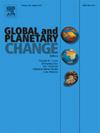上升流系统中的河口海洋热浪分析:以Ría de arousal为例
IF 4
1区 地球科学
Q1 GEOGRAPHY, PHYSICAL
引用次数: 0
摘要
海洋热浪是指长时间的异常高水温,具有显著的生态和经济影响。虽然这些事件在开阔的海洋系统中有充分的记录,但在河口环境中,特别是在上升流系统中,它们的特征和驱动因素却鲜为人知。本文利用2008 - 2023年实测数据,分析了伊比利亚半岛西北部上升流对Ría de a河口海洋热浪的影响。确定了38个EMHW事件,它们的发生与海洋热异常密切相关。在大尺度气候指数中,大西洋多年代际振荡(AMO)与EMHWs呈显著正相关,可解释其13.8%的变率。东大西洋(EA)指数与北大西洋涛动(NAO)指数无显著相关。强震和大陆架和公海的极端温度事件是强震的最强预测因子。相比之下,大气热浪(ahw)的影响较小。上升流指数呈弱负相关,仅解释了0.17%的强磁暴变率,而风强度占0.32%,表明上升流对强磁暴的缓冲作用有限。观察到明显的季节性模式,强强风在10月比夏季更强烈,可能是由于秋季上升流活动减少。虽然上升流可能发挥温和的调节作用,但其缓解极端事件的能力似乎有限。了解这些相互作用对于改进预测模型和管理电磁高压对具有重要生态和经济意义的河口环境的影响至关重要。本文章由计算机程序翻译,如有差异,请以英文原文为准。

Analysis of estuarine marine heatwaves in an upwelling system: The Ría de Arousa as a case study
Marine heatwaves are prolonged periods of anomalously high water temperatures and have significant ecological and economic impacts. While these events are well-documented in open ocean systems, their characteristics and drivers in estuarine environments, particularly within upwelling systems, are less understood. This study analyzes estuarine marine heatwaves (EMHWs) in the Ría de Arousa, a productive estuary influenced by the upwelling dynamics of the NW Iberian Peninsula, using measured data from 2008 to 2023. Thirty-eight EMHW events were identified, with their occurrence strongly linked to oceanic thermal anomalies.
Among large-scale climate indexes, the Atlantic Multidecadal Oscillation (AMO) exhibited a significant positive correlation with EMHWs, explaining 13.8 % of their variability. In contrast, the East Atlantic (EA) and North Atlantic Oscillation (NAO) indexes showed no significant relationship. MHWs and extreme temperature events (METDs) at the continental shelf and open ocean were the strongest predictors of EMHWs. In contrast, atmospheric heatwaves (AHWs) have a minor influence.
The upwelling index exhibited a weak negative correlation, explaining only 0.17 % of EMHW variability, while wind intensity accounted for 0.32 %, suggesting a limited buffering effect of upwelling on EMHWs. A marked seasonal pattern was observed, with EMHWs being more intense in October than in summer, likely due to reduced upwelling activity in autumn. While upwelling may exert a mild regulatory effect, its capacity to mitigate extreme events appears limited. Understanding these interactions is crucial for improving predictive models and managing the impacts of EMHWs in ecologically and economically significant estuarine environments.
求助全文
通过发布文献求助,成功后即可免费获取论文全文。
去求助
来源期刊

Global and Planetary Change
地学天文-地球科学综合
CiteScore
7.40
自引率
10.30%
发文量
226
审稿时长
63 days
期刊介绍:
The objective of the journal Global and Planetary Change is to provide a multi-disciplinary overview of the processes taking place in the Earth System and involved in planetary change over time. The journal focuses on records of the past and current state of the earth system, and future scenarios , and their link to global environmental change. Regional or process-oriented studies are welcome if they discuss global implications. Topics include, but are not limited to, changes in the dynamics and composition of the atmosphere, oceans and cryosphere, as well as climate change, sea level variation, observations/modelling of Earth processes from deep to (near-)surface and their coupling, global ecology, biogeography and the resilience/thresholds in ecosystems.
Key criteria for the consideration of manuscripts are (a) the relevance for the global scientific community and/or (b) the wider implications for global scale problems, preferably combined with (c) having a significance beyond a single discipline. A clear focus on key processes associated with planetary scale change is strongly encouraged.
Manuscripts can be submitted as either research contributions or as a review article. Every effort should be made towards the presentation of research outcomes in an understandable way for a broad readership.
 求助内容:
求助内容: 应助结果提醒方式:
应助结果提醒方式:


